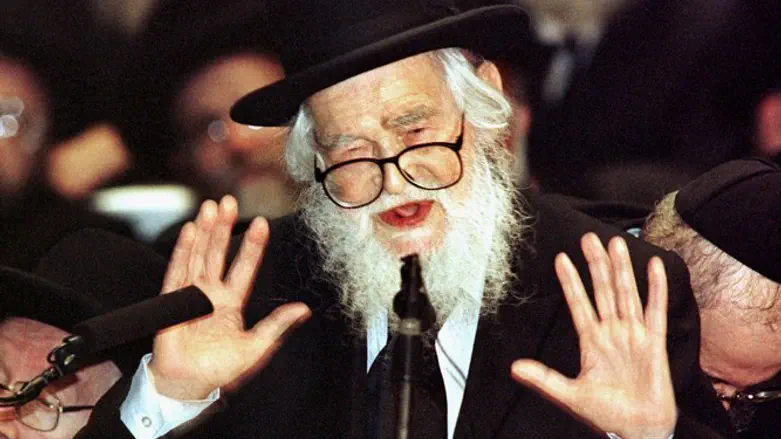
A few days ago, MK Moshe Gafni (United Torah Judaism), published the contents of a letter sent by the late Rabbi Elazar Menachem Shach in 1978 to Prime Minister Menachem Begin, indicating that there is no reason not to give up parts of the Land of Israel for the sake of peace.
One of the leading haredi rabbinic figures of the late 20th century, Torah luminary Rabbi Shach was influential in shaping the modern Lithuanian (non-hassidic, Litvish) haredi community in Israel.
Renowned as an arbiter of Jewish law, Rabbi Shach also played a critical role in shaping the political norms of the non-hassidic haredi public, and orchestrated the creation of both the Shas party and the Degel Hatorah party, today a faction within United Torah Judaism.
A critic of Zionism and the movement to settle Judea and Samaria, Rabbi Shach famously endorsed territorial concessions for a lasting peace with Israel’s Arab neighbors, and at times discouraged his followers from visiting Judea and Samaria during the First Intifada.
Yet Rabbi Shach’s positions regarding Israel’s presence in the heart of the historic Jewish homeland were complex, and in the midst of the First Intifada he endorsed the establishment of a new Jewish community – Modiin Illit – in southwestern Samaria.
Arutz Sheva spoke with journalist Benny Rabinovitch about Rabbi Shach’s letter and its implications.
Rabinovich noted the unique circumstances in which the letter was written, "It was during the period of the talks between Israel and Egypt. There was opposition from the right, and Rabbi Shach saw fit to express his position in a clear and concise manner. And that position is very simple - the land of Israel belongs to the people of Israel and there is no argument about that. But if we reach a point where [giving up parts of the land] is necessary to prevent bloodshed, then an arrangement can be made."
Rabinovich also noted that many Likud members predicted disaster if Israel withdrew from the Sinai Peninsula, including ministers Tzachi Hanegbi, Geula Cohen, and former Prime Minister Yitzhak Shamir. However, the peace treaty with Egypt has held for nearly 40 years.
According to Rabinovich, Rabbi Shach differentiated between the Camp David peace accords with Egypt and the Oslo Accords with the PLO. "When it came to the Oslo Accords, he was very firmly against those agreements. He said that a bad government cannot do good [in trading land for peace] - and we see the results of the Oslo Accords. We all see that the Oslo Accords were the worst thing that could have happened, and even Dalia Rabin, [the daughter of former Prime Minister Yitzhak Rabin], says it is possible that her father would have regretted these agreements and not continued them [had he not been assassinated]."
"An absolute majority of the haredi world's greatest sages believe that in return for a peace agreement, it is permissible and even obligatory to return territories, not because it is not ours, but because the prevention of bloodshed is above all other considerations, even above considerations of the land of Israel."
Rabinowitz stressed that "even when Rabbi Shach spoke about 'territories for peace', he stressed that everything should be done in consultation with security officials who would determine that the agreement could stand in terms of security. If it could not, it would be impossible to hand over territories for mere promises of peace. The problems start when security officials get mixed up in politics, from the left and the right."
Toward the end of his speech, Rabinowitz called on the haredi public and the national religious public to join hands regarding all their common issues and to leave behind their disagreements - as fundamental as they may be - over their relationship to the state and the army.